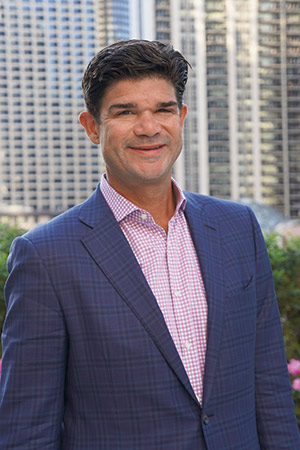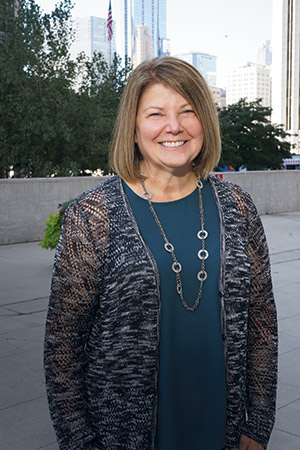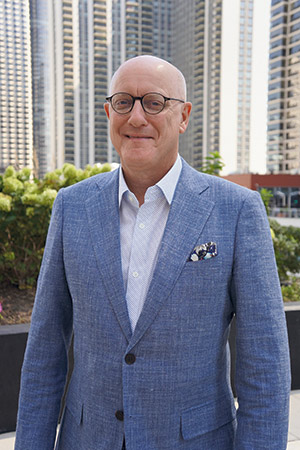What will the foodservice industry look like in 2028?
Hard to say with certainty but thinking about the future can help crystalize it. Embracing new ways to do things, where to improve, and examining how a company spends its time now, in the moment, can help ensure a fortuitous destiny.
Three industry stalwarts set the tone for greatness.
Mark Rossi, CEO and Founder, Avanti Restaurant Solutions, Costa Mesa, Calif.
 Seven years after Rossi started Avanti — which means “forward” or “charge” in Italian — the company made its first appearance on FE&S’ Distribution Giants Top 100 list, coming in right at No. 100 in 2010. Rossi continues to aggressively grow the company, which most recently hit the No. 46 spot on FE&S’ Distribution Giants list.
Seven years after Rossi started Avanti — which means “forward” or “charge” in Italian — the company made its first appearance on FE&S’ Distribution Giants Top 100 list, coming in right at No. 100 in 2010. Rossi continues to aggressively grow the company, which most recently hit the No. 46 spot on FE&S’ Distribution Giants list.
What’s shaping the industry?
The supply-demand continuum seems upside down. Supply is outrunning demand but prices keep going down. On the surface that looks like a scenario that helps the end user. The question is whether these companies can provide the level of service [the end user] needs for the price they pay?
M&A could also be fueling this fire; the “acquirers” are looking to add sales volume, and the “acquired” are doing whatever it takes to get it.
Do you foresee industry change?
It does feel to me that something is going to have to give.
Every other industry, I believe, has experienced some streamlining to their supply chain and I believe we have continued to hold out. It’s not going to be fun. Today, the lines between rep groups, dealers and consultants are all starting to blur a bit.
That’s causing relationships to change. People who used to work together to win business now are seeing each other more as competitors. That applies to everyone in some way, shape or form. Our service cannot be replaced by a click on a mouse, but as the operator becomes a more sophisticated buyer, we sure better be able to define our value as a viable partner in the chain.
What’s it going to take to be successful in the future?
As we transition from a startup to high-growth company, that means different needs and skillsets. We want to not lose some of the pieces that got us here — culture, core competencies — yet at the same time, we realize that what got us here might not get us there.
Beth Kuczera, President, Equipment Dynamics Inc., Chicago
 As a seasoned commercial foodservice specialist, Kuczera’s career has connected to foodservice in a variety of ways. Her start with a smallwares manufacturer lead her to transition to a manufacturers’ rep group, then to the dealer arena and finally to founding her own boutique design consultancy in 1995.
As a seasoned commercial foodservice specialist, Kuczera’s career has connected to foodservice in a variety of ways. Her start with a smallwares manufacturer lead her to transition to a manufacturers’ rep group, then to the dealer arena and finally to founding her own boutique design consultancy in 1995.
Can you talk about a time your company learned the art of perseverance?
Roughly six years ago, through a combination of situations and people, I was nearly crushed. The sweet survival is still hard to put into words, and it gave birth to the ‘fun phase’ of our work.
Change comes from strategic planning, and at times it happens without warning. But this became yet another example of how what appears to be devastation, with the bumps and bruises still raw, can lead to an amazing business direction.
How will you use what you learned in 2018 to shape the future?
Who wrote the rules anyway?! Have you asked for and reviewed your NPS [Net Promotor Score]? Are you the default vendor or the preferred vendor? I look to differentiation to pave the way to our future. Success is not something that is imitated, it is created. Developing skills, tools and communication vehicles that deeply support the success of our clients can translate to meaningful relationships, along with the profit to support talented employees and run a business. If you have something worthwhile to sell, it has been our experience you will have customers.
What will the industry look like a decade from now?
Will automation and the shrinking labor pool change the landscape of dining? Will food as the centering spot of living dissipate? I could not have predicted that carbon footprint discussions would be replaced with same and next day food delivery. Memorable moments and unique meals with awesome companions, even in the fast-casual restaurant world we live in, I believe will not lose its focus.
David Chislett, FCSI, Executive Principal, Ricca Design Studios, New York
 With a background that includes serving as an executive chef, corporate food and beverage director, and hotel F&B design/construction manager, Chislett’s 35 years associated with foodservice brings hands-on, in-the-trenches expertise to the design process.
With a background that includes serving as an executive chef, corporate food and beverage director, and hotel F&B design/construction manager, Chislett’s 35 years associated with foodservice brings hands-on, in-the-trenches expertise to the design process.
What’s currently keeping you up at night as it relates to your company?
Three things that come to mind are: a next-generation talent search, a shift in project construction contractual methods — GMP [guaranteed maximum price], CM at R [construction management at risk], etc., and foodservice contractor quality.
Looking back, what were some corporate lowlights?
While we were rocked by the recent Great Recession, like most other firms, we came out of it leaner and more strategic in regard to our staffing profile, diversity in project types and broader market penetration.
How will you use what you learned in 2018 to shape the future?
We believe that caring for our clients is paramount for our short- and long-term success. Toward that end we are committed to investing in and caring for our team. When we empower, encourage and further develop cutting-edge tools for use by our team, we find that excellent client care becomes job one for them.
We are looking forward to partnering with wider team members in the AEC community.
What’s the biggest change you see coming?
Technologically based, sophisticated and, most importantly, easy-to-use digital design/documentation tools. These tools have the potential to turn the “design” portion of our discipline into more of a commodity.



